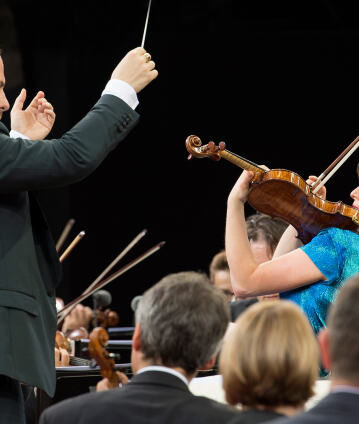Yannick Nézet-Séguin and Lisa Batiashvili

At this concert, Yannick Nézet-Séguin, chief conductor of the Philadelphia Orchestra, encounters Lisa Batiashvili – a both virtuoso and sensitive violinist, and thus the ideal interpreter of Bartók’s yearning Violin Concerto No. 1, in which the composer came to terms with an unrequited love. Following this, the orchestra performs Shostakovich’s 13th Symphony: a staggering accusation against anti-Semitism in the Soviet Union.
When Yannick Nézet-Séguin, music director of the Rotterdam Philharmonic, first guest conductor of the London Philharmonic and chief conductor of the Philadelphia Orchestra, debuted with the Berliner Philharmoniker in October 2010, the press wrote that it had been a “memorable evening” with a “rising star in the conducting firmament”. At this guest appearance with the Philharmoniker, the effervescent Canadian conducts Béla Bartók’s First Violin Concerto. The soloist is Lisa Batiashvili, who gave a “brilliant debut” with the Philharmoniker in 2004: The young Georgian found her way – free of all technical troubles – to a “luminous inward quality; it is gripping and inspired, virtuosic and intelligent” (Der Tagesspiegel).
After the interval, Yannick Nézet-Séguin takes on Dmitri Shostakovich’s 13th Symphony together with the bass Mikhail Petrenko and the male voices of the Rundfunkchor Berlin. The work was composed in 1962, and is a confessional work against anti-Semitism, which was increasingly gaining ground in the USSR in the 1960s. The textual basis of the symphony is Yevgeny Yevtushenko’s 1961 poem Babi Yar, in which the poet recalls the mass murder of 34,000 Jews by the SS in September 1941 and in the last stanza identifies himself with the victims. “At the premiere,” the Russian music historian Boris Schwarz writes, “the government’s box remained empty, and the planned television broadcast did not take place. […] There was spontaneous applause after the first movement; when the work, an hour in length, was over, an enthusiastic storm of applause broke out in the audience such as one experiences only rarely.”
Shostakovich’s 13th Symphony was officially hushed up. The Soviet press wrote that the “content of the ideas contains fundamental errors”; in addition, the composer had “lost his feeling for the time”. A score was published in the USSR only in 1971, but with the vocal text changed in places. Today Babi Yar, a vocal-symphonic masterpiece of the 20th century that since then has lost none of its shattering impact, is among Shostakovich’s best-known compositions.
© 2016 Berlin Phil Media GmbH
Related interviews
Artists
Our recommendations
- A Czech evening at the Waldbühne
- Kirill Petrenko and Lisa Batiashvili
- Paavo Järvi and Lisa Batiashvili with Sibelius’s Violin Concerto
- 2024 Europakonzert with Daniel Harding and Lisa Batiashvili from Tsinandali (Georgia)
- Alan Gilbert and Lisa Batiashvili
- 2007 Europakonzert from Berlin with Simon Rattle, Lisa Batiashvili and Truls Mørk